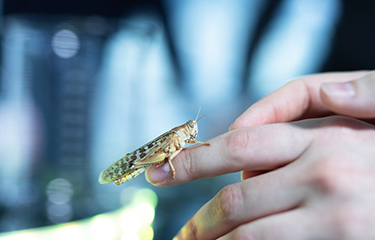Bergen, Norway-based Salmon Group has joined forces with Ålesund, Norway-headquartered startup Metapod to develop a new, locally-produced protein source featuring insects for inclusion in salmon feed.
Under the agreement, Metapod will produce insect flour from grasshoppers and crickets to be used in feeds for Salmon Group’s network of salmon and trout farms. The process will also involve the refinement of food waste, a move that will see Salmon Group reduce its carbon footprint and reintroduce “a valuable resource” back into its value chain, the company said in a press release.
“The way Metapod considers resources corresponds with our sustainability work in practice. It does not claim land or resources which could be utilized for other food production for humans or animals. Additionally, they introduce a residual raw material – a ‘problem resource,’ so to speak – from other food production which otherwise would not have the same value,” Salmon Group Purchasing and Feed Manager Nils Inge Hitland said.
The insect organisms that compose the startup’s protein source will be fed with leftovers from bread and brewery production, components that would otherwise end up as waste, the firms noted.
According to Metapod and Salmon Group, “nutritious insect meal can compete with the main source of protein in today's diet for farmed fish, namely soy and fishmeal.”
Metapod Founder and CEO Frederick Darien said his company’s production process wasn’t just energy- and area-efficient, but locally optimized as well, with short transport along the Norwegian coast to feed factories.
“Primarily, we start breeding of grasshoppers to accommodate a large and growing need for new sources of protein and more, and more nutritious, food to the world's population. Large-scale grasshopper farming is new, and we have built our technology from scratch. Here we have control of all aspects and factors of the production and can thus ensure a safe and nutritious food source,” Darien said.
Salmon Group has been continually adjusting its feed recipe “to ensure optimal use and mix of all ingredients of raw materials,” which in turn offers good animal health, a low carbon footprint, and the best possible quality of the salmon that meets the market, it said.
“This adds to the range of measures we take to achieve a feed that meets stringent requirements for more balanced resource management in all blocks in the chain,” Hitland said. “We must take an active part in this development, and the collaboration with Metapod is one such initiative, similar to the adjustments we made to the raw material composition in our feed last summer. We must act now, we cannot wait for others to make changes. It is our responsibility as an industry player to take this social responsibility.”
In Norway, there have yet to be any salmon farming companies that have introduced insect flour from grasshoppers as an ingredient in feed, Darien said – until now, with Salmon Group.
“There are no companies in the industry of Norwegian salmon farming that have introduced insect flour from grasshoppers as an ingredient in the feed. It is very exciting that an innovative and forward-thinking grouping such as Salmon Group, which represents such a large share of the production volume in Norway, invests in this. For us, this means that we can start large-scale production from day one and develop the concept further,” he said.
As a result of COVID-19, Metapod and Salmon Group expect a new emphasis on local production and short transportation.
“To be able to produce more sustainably, there will necessarily be requirements for shorter transport distances, the use of unused or poorly used resources, reduced water consumption, the search for alternative protein sources, and the creation of more local jobs,” the companies stated.
“In other words, it is important to quickly find good, smart, and lasting solutions to climate and environmental challenges that ensure resources to remain in the economy as long as possible. Not least, this can contribute to solutions that can be used globally and ensure food safety and food security,” Hitland added.
Photo courtesy of Metapod







